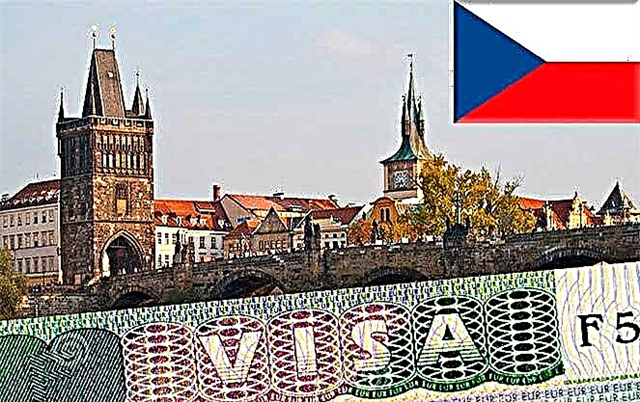A Schengen Category C visa allows Russians to travel to most European countries for several months for tourism or business travel without any problems. But in order to stay in the countries of the Agreement for a longer period, for example, for work or study, in 2021 it is still necessary to issue a separate category of visas. Therefore, it is worth considering what a national visa (visa D) to the Czech Republic is like, how it differs from other categories of Czech visas and how to correctly apply for it.

Features of the Czech national visa D
The main difference between the D document and other types of Czech visas is the length of stay in the country. While the most popular category C visa gives the right to stay on the territory of the republic for up to 90 days, the long-term Czech visa type D allows the holder to stay in the Czech Republic for a year.
Once the permit expires, you can renew it or apply for a residence permit. A type D permit is always a separate document that is pasted into the passport and usually looks like this:

At the same time, the list of acceptable reasons for travel, allowing you to issue a long-term document, is much shorter than for short-term visas, and includes:
- work in the Czech Republic under a contract or doing business in the country (both your own and as part of the founders of a joint venture);
- study at one of the universities of the republic;
- scientific activity;
- participation in sports or cultural events;
- undergoing long-term treatment in one of the medical institutions;
- reunification with close relatives permanently residing in the country.
For each of these reasons, state legislation provides for a separate subtype of permission. The D / VC code on the document is placed on all its categories, the subsequent characters in this code depend on its type. The documents required for obtaining different types of category D visas differ and you should pay special attention to this when making an application so as not to face a refusal.
- Work visas are designated D / VC / 01 and are issued to employees of both public and private enterprises located in the Czech Republic. If the contract with the holder of such a permit is terminated, he has 3 days to find a new job. If he fails to find a job during this period, he is obliged to leave the country.
- The study permit is designated by the code D / VS / 08 and is issued to all persons who have successfully entered accredited universities in the republic.
- The document for moving to relatives is characterized by the code D / VS / 03.
- Co-founders of Czech enterprises receive a document with the designation D / VS / 36, which gives the right not only to reside in the Czech Republic, but also to move freely in the Schengen countries, as well as to do business. Holders of such a permit after 5 years of residence in the country can apply for a residence permit.
- Private entrepreneurs can count on obtaining a permit of type D / VS / 06, which allows them to do business in the Czech Republic without creating a legal entity, subject to obtaining an appropriate license.
Procedure for obtaining a visa category D
In order to apply for a long-term travel permit to the Czech Republic, you need:
- Make an appointment at the Czech Republic's embassy in the Russian Federation or at the republic's consulate located closest to your place of residence.
- Collect all the necessary documents for the subtype of visa for which you want to apply.
- Go through the procedure for submitting biometric data in advance if you are applying for the first time or submitted them more than 5 days ago.
- At the appointed time, appear at the reception at the diplomatic mission with a full package of documents and undergo an interview. Please note that when applying for a national visa, the interview takes place in Czech.
- Expect letters from the Czech Ministry of Internal Affairs to the address indicated in the application.
- In case of a positive decision, visit the consulate in which you applied and receive a ready-made document.
The embassy of the republic in Russia is located in Moscow at the address: st. Yu Fucik 12/14. You can make an appointment by writing an email to [email protected] or by phone +7 (495) 276-07-02.
In the letter, you must definitely indicate your passport details from your foreign passport, its number and date of issue, your date of birth, the visa subtype for which you are applying, your contact information.
Also, you need to attach a scanned copy of your passport and a document confirming the purpose of the trip to the letter (contract with the employer, certificate of relationship, and so on).
The consulate of the Czech Republic in St. Petersburg is located on the street. Tverskoy, 5. You can make an appointment by phone. + 7 (812) 271-04-59. The diplomatic mission in Yekaterinburg is located on the street. Gogol, 15, phone + 7 (343) 379-47-62.
List of required documents
To apply for any category D Czech visa, you must provide the following documents:
- a passport with 2 blank pages, the validity of which exceeds the planned end of the trip by at least 3 months;
- a copy of the first page of the foreign passport and all previously issued Schengen visas, as well as a copy of the national passport;
- a completed visa application form (you can download the form and a sample of filling from the website of the Czech Embassy);
- documents confirming the purpose of your travel according to the subtype of the permit;
- health insurance policy in the Schengen area for the entire trip;
- two color photographs measuring 3.5 x 4.5 cm;
- certificate of no criminal record;
- biometrics data.
All copies of documents must be certified by a notary and accompanied by a translation into Czech. Depending on the type of application, the following additional documents will also be required:
| Type of visa | The documents |
|---|---|
| Working | A contract with an employer, a work permit in the Czech Republic, confirmation of a residence in the country, guarantees of the availability of funds at the rate of 81,400 kroons per year. |
| Student | A document confirming successful admission to a university in the Czech Republic, guarantees of the availability of funds at the rate of 81,400 kroons per year. |
| For family rebuilding | Notarized certificates of kinship, invitation from a family member residing in the country |
| For co-founders of firms | Documents confirming participation in the composition of shareholders or co-founders of a company registered in the Czech Republic |
| For business | License for the proposed activity, financial guarantees, proof of residence |
If you need to issue a permission to leave the child, you will need to submit:
- birth certificate;
- parental consent for the child to leave;
- the visa of the person accompanying the child (must have already been obtained at the time of application).
How long does it take to get a visa and how much does it cost?
The official processing time for an application for a long-term visa is up to 120 days. In the case of a student permit, the period is slightly shorter - up to 90 days. If the consulate needs to clarify the documents submitted by the applicant, the period may be extended.

The total cost of the finished document consists of several components:
- visa fee, which officially amounts to 2500 CZK (about 100 euros) and is paid exclusively in cash in euros;
- the cost of medical insurance with coverage from 30,000 € (usually it costs from 2 € per day);
- fee for the delivery of biometric data (if necessary), which is 150 €.
Children under 6 years of age are exempted from paying the consular fee.
When submitting an application through intermediary agencies, a service fee is also added to the specified components, as a result of which the total price of the document can reach 1000 euros.
Possible reasons for refusal
Not all applications for Schengen visas end with a positive answer. The most common causes of failure are:
- lack of required documents;
- errors in filling out documents or their incorrect legal registration;
- visa refusals received in the past both to the Czech Republic and to other Schengen countries;
- violation by the applicant of the visa legislation of the Czech Republic or other countries during previous trips;
- the established discrepancy between the declared purpose of the trip and the type of visa application (for example, the applicant claims that he wants to study in the country, and at the same time applies for a work visa);
- the applicant does not have financial assets or valuable property in the home country;
- submission of irrelevant information (inconsistency of the address, contact information, place of work, specified in the accompanying documents, and so on);
- unsatisfactory results of the interview (the applicant did not answer all the questions at the consulate, his answers or behavior seemed unconvincing to the diplomatic officer and allowed him to doubt the true purpose of the trip);
- providing knowingly false information or forged documents.
Upon receipt of the notice of rejection, the applicant has the right to appeal.
Please note that the refusal letter does not come from the consulate, but from the Czech Ministry of the Interior, and it is to this department, not the consulate, that you must address the appeal.
The deadline for submitting this document is only 15 days from the date of receipt of the notification of the negative decision, while the appeal must be made exclusively in the Czech language. It is not allowed to draw up this document in free form, it must follow the norms established by Czech law.
Copies of all documents confirming that the applicant has a legal basis for reviewing the decision must be submitted with the appeal. You need to send an appeal by registered mail to the address of the Ministry of Internal Affairs of the Czech Republic (the same address from which you received the refusal letter).
Instead of filing an appeal, you can ask the consulate in writing to explain the reasons for the refusal. Having received the answer, you need to eliminate the shortcomings identified in your application (for example, submit missing certificates) and contact the consulate again with the corrected documents.
Answers to frequently asked questions
You can find out if your visa is already ready by calling the consulate or embassy (for Moscow it is +7 (495) 276-07-11), where you applied, or by writing an email to the consular department ko.moskva@embassy. mzv.cz. If you applied through intermediaries, then for clarification, you should first contact them.
Also, the holder of a work visa or other document of category D has the right to transit through other Schengen countries within 5 days.
In order to obtain the right to free travel within the Schengen countries within the first 3 months after the issuance of the document, you must apply for another type of visa, called D + C.
A bank statement issued 8, 6 or even 4 months before the application submission may result in a refusal to issue a permit. The certificates must be issued no earlier than 3 months before the date of application.
Conclusion
A Czech national visa (category D) allows the holder to stay in the Czech Republic for the entire duration of its validity (which is usually one year). Different types of such a document give its owner the right to work or study in the republic, as well as to be reunited with family members living in it. At the same time, unlike a type C visa, the holder of a national permit cannot freely move around the countries of the Schengen area.











